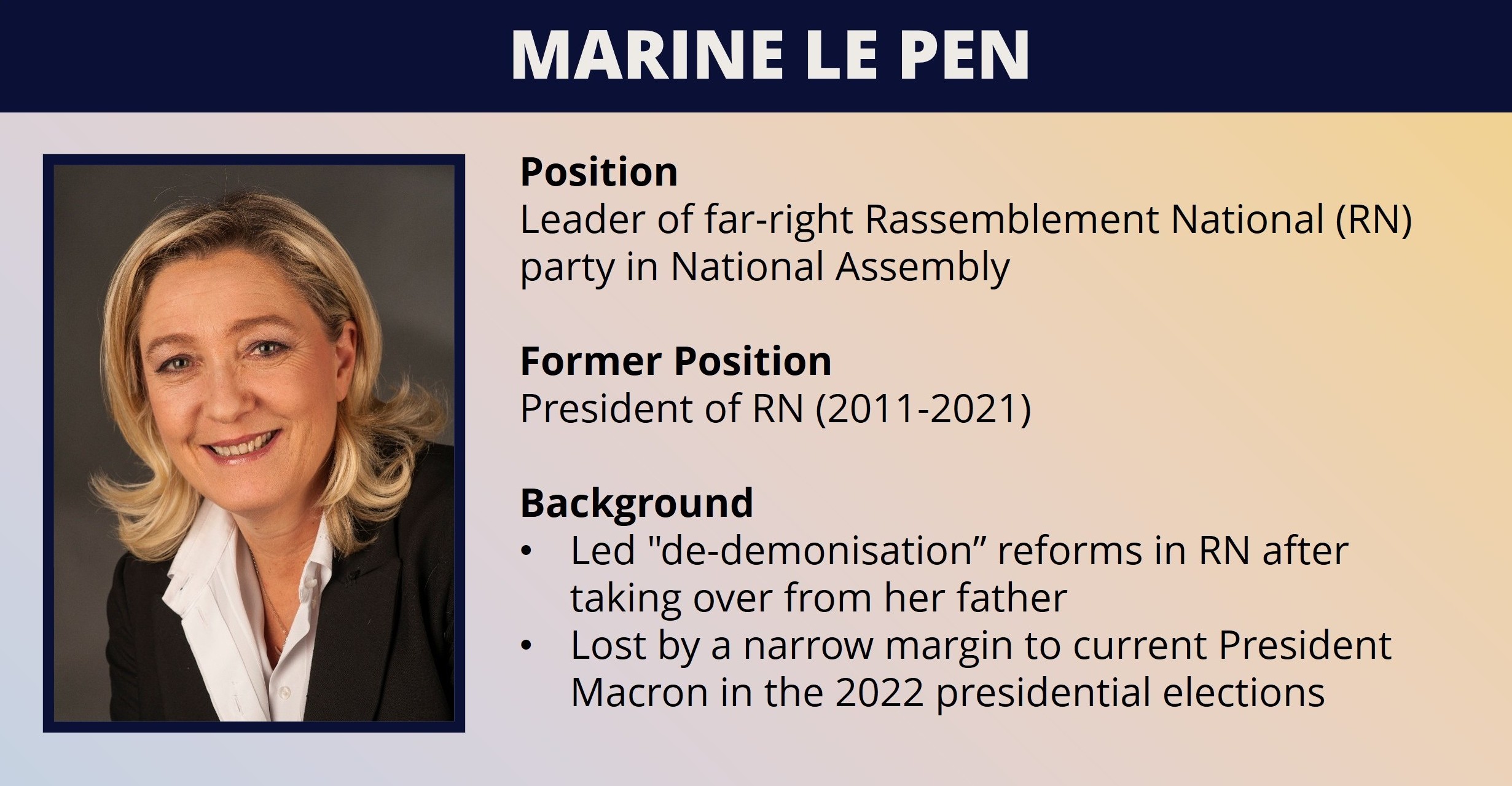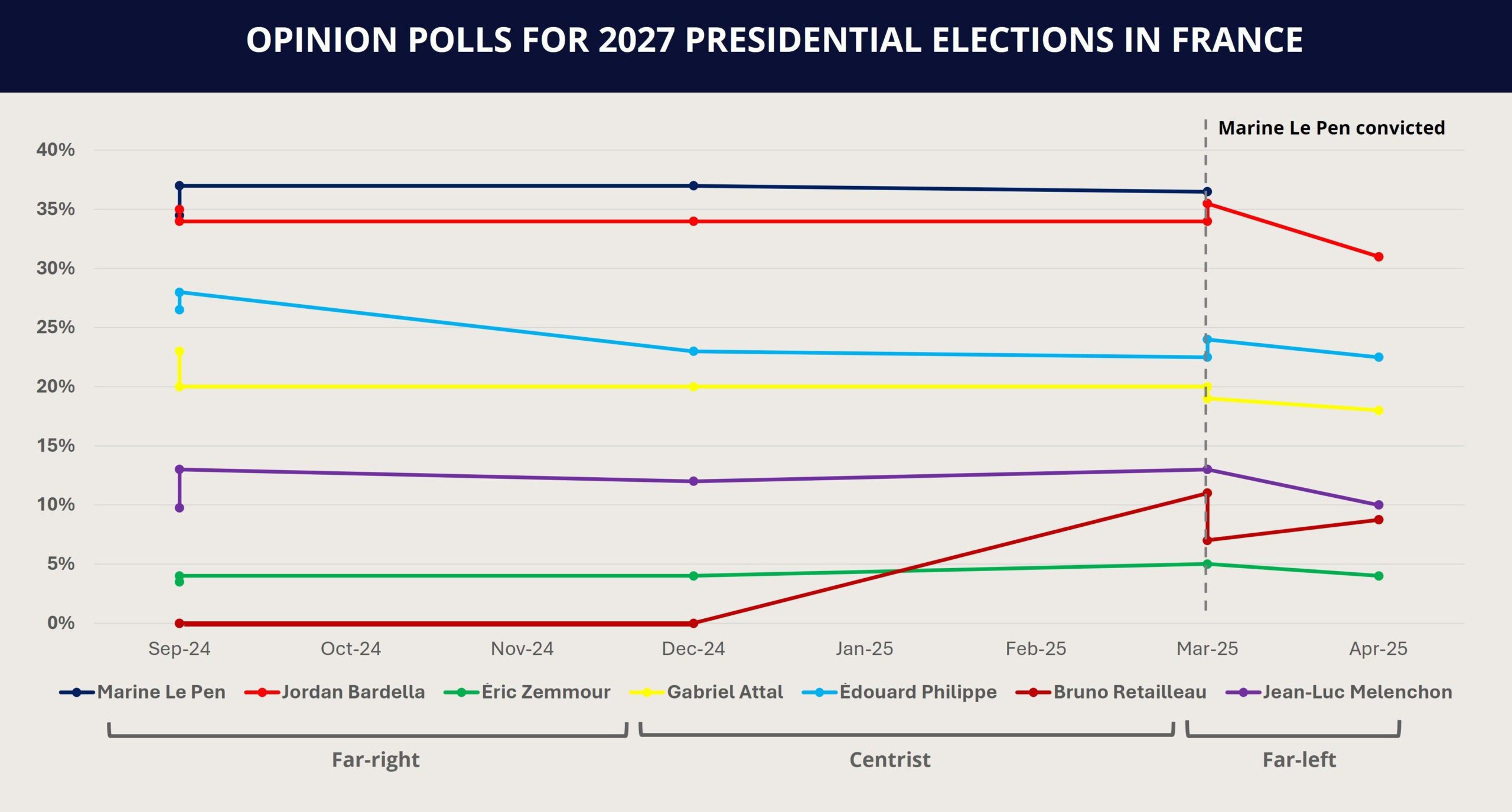
MAX Intelligence: Marine Le Pen Verdict – Impacts on France’s Political Stability
- MAX Security
Table of Contents

Le Pen’s conviction stirs political tension in France. While mass unrest is unlikely, government stability faces new threats. Stay alert, stay informed.
Executive Summary
-
The far-right Rassemblement National (RN) party organized sporadic protests in April to denounce the conviction of its leader, Marine Le Pen, in an embezzlement case. The verdict made her ineligible to run for office for the next five years.
-
The conviction is likely to decrease RN’s willingness to give tacit support to PM Bayrou’s center-right minority government in the parliament.
-
The ruling also increases the potential for RN to cooperate with the left-wing bloc to bring down the government in a successful no-confidence motion, thereby increasing political instability.
-
Although RN will continue to organize sporadic protests, large-scale far-right mobilization in Le Pen’s support remains unlikely in near term due to her decreased popularity among grassroots far-right groups.
-
Travel to France may continue while adhering to standard safety protocols and remaining cognizant of ongoing political developments.
Current Situation
-
On March 31, the Tribunal correctionnel de Paris, a Paris criminal court, found Marine Le Pen, parliamentary leader of the far-right Rassemblement National (RN) party, and eight RN members of the European Parliament guilty of misappropriating public funds.
-
Le Pen was sentenced to four years in prison, two of which are to be served under house arrest, a five-year ban on running for office effective immediately, and a 100,000 EUR fine.
-
In response to the ruling, protests have been organized sporadically by the RN in support of Le Pen. The turnout recorded at such protests has been significantly lower than what was anticipated by RN. For instance, the largest rally organized by RN in Le Pen’s support was held in Paris on April 6 and was attended by about 4,000 people, less than four percent of the party’s total membership. A left-wing counterdemonstration garnered a similar turnout of 5,000. The protests witnessed minor scuffles but no widespread unrest.
-
Similarly, left-wing protests against RN called by nearly 30 organizations, including trade unions and human rights groups, in 40 cities nationwide on April 12 witnessed participation in the low dozens to low hundreds. Some protests were eventually called off due to lack of participants. No unrest was reported.
-
Le Pen has stated that she would fight the ban peacefully. She has called the ruling a “political decision” aimed at blocking her path to presidency and stated that she would use “all avenues” to appeal it. This includes France’s Constitutional Court, the European Court of Human Rights (ECHR), and the Paris court of appeal.
-
The Paris Court of Appeal has stated that it will deliver the verdict on Le Pen’s appeal by June 2026.
-
Before her arrest, Le Pen was leading in polls for the 2027 presidential elections at 34-37 percent. She was followed in polls by Jordan Bardella, president of RN, at nearly 30 percent and by former Prime Minister and founder of the center-right Horizons party, Edouard Charles Philippe, at nearly 25 percent. The French constitution bars current President Emmanuel Macron from a third consecutive mandate in 2027.
Assessments & Forecast
RN to limit cooperation with center-right government, increasing risk of successful no-confidence motion
-
While there is precedent of politicians being barred from office in France, the court’s latest decision is highly notable due to Le Pen’s position as a high-profile far-right opposition politician. That the court enforced Le Pen’s ineligibility immediately after the ruling is also notable given that sentences are typically suspended during the appeal period in French judicial norms. While Le Pen has stated her intent to appeal the decision, the legal process of this is expected to be lengthy, given the number of defendants and the complex nature of the case, thereby lowering the likelihood of such an appeal to be successful before 2027. Considering this, the ruling will have significant implications for France’s political landscape – particularly on the current center-right government led by Prime Minister Francois Bayrou.
-
Since the snap elections in 2024, Bayrou has led a minority government that has depended on parliamentary support from either the RN or factions of the left-wing Nouveau Front Populaire (NFP) alliance, offering concessions in return for their legislative backing. FORECAST: With Le Pen calling the ruling a political decision, aimed at barring her from the presidential race, this is expected to reduce RN’s willingness to cooperate with Bayrou’s government. Consequently, the government’s dependence on the NFP for parliamentary support will increase. However, given that NFP members have typically been less willing to support the government in the past compared to RN, Bayrou is anticipated to face increased difficulty in passing legislation.
-
FORECAST: The RN is also likely to view the current period as ideal to undermine Bayrou’s government through no-confidence motions with the goal of triggering snap legislative elections. This is especially considering that the one-year moratorium on successive elections following the June-July 2024 snap election will end by the summer of 2025. As such, the likelihood of RN either supporting or tabling motions of no-confidence against Bayrou will be high in the coming months, especially if Bayrou resorts to the use of Article 49.3. The article allows the government to pass a bill without a parliamentary vote and, as such, has previously resulted in motions of no confidence when used.
-
FORECAST: Meanwhile, the likelihood of the NFP supporting or tabling a no-confidence motion against Bayrou is also currently heightened due to the re-emergence of tensions between the ruling government and left-wing political circles over pension reforms. Bayrou survived several no-confidence motions in February due to abstentions from RN and the NFP’s Parti Socialiste (PS). However, the PS only backed Bayrou on the condition that the government continues discussions on pension reforms, namely lowering the retirement age from 64 to 62. With Bayrou recently making comments opposing such a reform in the retirement age, there is an increased potential that PS and other more moderate members of the NFP would now support a motion of no confidence against the government. As such, with both RN and NFP more willing to support a no-confidence motion, the likelihood of such a motion to succeed has increased.
Widespread protests for Le Pen remain unlikely amid limited backing from grassroots far-right groups
-
The low frequency of demonstrations in support of Le Pen following the verdict, coupled with their low scale of turnouts, despite the high-profile nature of her conviction, indicates a limited risk of civil unrest associated with the verdict. This is predominantly due to Le Pen’s unfavorable position among grassroots far-right groups and other far-right political parties, which are more radical in their political views and are often the driving force behind large-scale far-right mobilization and associated unrest in France. Such radical actors view Le Pen’s alleged moderate approach as a negative, claiming that she has forced RN to depart from the party’s founding ideologies to appeal to the mainstream. For example, Thomas Joly of the Parti de la France party, which supports the Nazi-era Vichy regime, stated that the low turnout at the RN rally in Paris on April 6 was “well-deserved” for Marine Le Pen “who spent years snubbing grassroots activism.”
-
FORECAST: As such, while the RN party is expected to continue to call for protests in support of Le Pen over the coming months, large-scale far-right mobilization or unrest over the issue is unlikely. With that, demonstrations in Le Pen’s support are likely to be infrequent and relatively small in scale.
-
FORECAST: Similarly, while left-wing or far-left groups may stage counter-protests in response, these are also expected to be limited in scale and unlikely to escalate significantly. This is due to verdict itself being largely seen as a political win among these circles, with the low attendance at recent RN rallies likely also diminishing their perceived urgency to mobilize in response.
-
FORECAST: That said, despite the disregard for Le Pen herself, given that far-right groups continue to interpret the ruling as part of a broader political campaign against the far right, the risk of isolated acts of violence—including against members of the judiciary or left-wing political figures—may increase in the coming months. This is supported by recent reports indicating that judges of the Paris Criminal Court involved in Le Pen’s case are facing online death threats. Such incidents could manifest as vandalism, harassment, or targeted physical attacks targeting political offices, court buildings, or individual officials.
Recommendations
-
Those operating or residing in France are advised to remain cognizant of the ongoing political developments over the coming months.
-
Maintain heightened vigilance in the vicinity of potential political protests by far-right, as well as left-wing groups.
-
Public, private, and third-sector organizations should enhance social media threat monitoring to detect potential threats from extremist groups.
-
Avoid discussing potentially sensitive topics with locals in public spaces.
-
For more information on the political and security situation, please contact intel@max-security.com
SCOUT
INTEL AI BY MAX SECURITY
Fill in your details to schedule a demo with our team.




